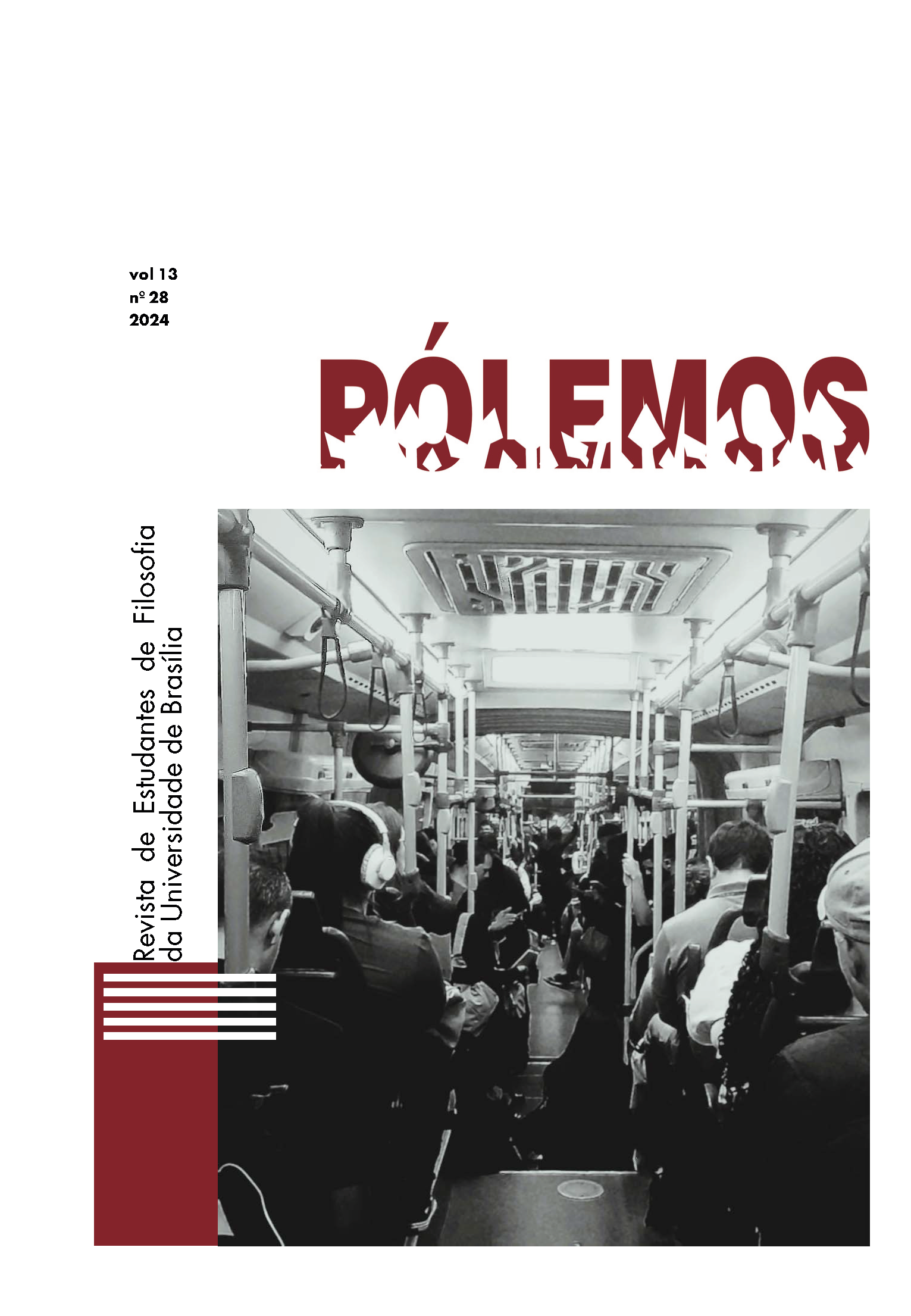THE NATURALIST THEORY OF NAMES IN PLATO'S "CRATYLUS"
Keywords:
Plato. Cratylus. Language. Categorization. Forms.Abstract
This article aims to conduct a detailed analysis of Plato’s work Cratylus, proposing that it is organized according to a dialectal pattern in which the philosopher strives to refute two inadequate philosophical positions: those of Euthydemus and Protagoras. We identify that the central problem of these theories lies in their ontological foundations, as both articulate a world devoid of logical-ontological criteria governing the use of language. Plato criticizes these positions, exposing their undesirable consequences, particularly in the ethical and epistemological domains. The main thesis of this article is that Plato endeavors to delineate, in contrast to these two eccentric theses, a minimal philosophical project that allows for the typification of beings into different categories, in accordance with objective and enduring properties (εἴδη, “forms”). This project aims to support the methodological viability of language, dialectics, and ethics.
Downloads
References
ADEMOLLO, F. The Cratylus of Plato: a commentary. Cambridge: Cambridge University Press, 2011.
ALLEN, R. E. Plato’s Earlier Theory of Forms. In: VLASTOS, G. (Ed.). The Philosophy of Socrates. Palgrave Macmillan, 1971, pp. 319-334.
ARISTÓTELES. Metafísica – Livros IV e VI. Trad. Lucas Angioni. Clássicos da Filosofia: Cadernos de Tradução, Campinas/SP, IFCH/UNICAMP, n. 14, 2007.
BORGES, Anderson de Paula. Fluxo e Infalibilismo em Teeteto 151-160. Journal of Ancient Philosophy, v. VI, n. 2, p. 1-30, 2012. DOI: https://doi.org/10.11606/issn.1981-9471.v6i2p1-30.
BORGES, Anderson de Paula. A Interpretação Aristotélica do Pensamento Protagoreano em Metafísica Γ 4-6. Journal of Ancient Philosophy, São Paulo, Vol. 11, N. 2, 2017. p. 82-105.
BURNYEAT, Myles. Conflicting appearances. In: Burnyeat, M. Explorations in Ancient and Modern Philosophy, Vol. 1. Cambridge: Cambridge University Press, 2012, pp. 276-315.
BURNYEAT, Myles. The Theaetetus of Plato: with a translation of Plato’s Theaetetus by M. J. Levett revised by Myles Burnyeat. Indianapolis/ Cambridge: Hackett Publishing Company, 1990.
CODE, Alan. Aristotle’s Investigation of a Basic Logical Principle: Which Science Investigates the Principle of Non-Contradiction?. Canadian Journal of Philosophy, v. 16, n. 3, p. 341-358, 1986. Disponível em: https://www.jstor.org/stable/40231475. Acesso em: 13 março 2024.
CORNFORD, Francis MacDonald. Plato’s Theory of Knowledge: The Theaetetus and the Sophist of Plato translated with a running commentary. London: Kegan, Paul, Trench, Trubner & CO. LTD; New York: Harcourt, Brace and Company, 1935.
EMPIRICUS, Sextus. Outlines of Scepticism. Trad. Jonathan Barnes. Cambridge: Cambridge University Press, 2000.
FERRARI, Franco. Teoria das Ideias. In: CORNELLI, G.; LOPES, R. (Coord.). Platão. Coimbra: Imprensa da Universidade de Coimbra, 2018, pp. 213-228.
PLATÃO. A República. Trad. Anna Lia Amaral de Almeida Prado. 2. ed. São Paulo: Martins Fontes, 2014.
PLATÃO. Crátilo. Trad. Celso de Oliveira Vieira. São Paulo: Paulus, 2014.
PLATÃO. Cratylus. Trad. C. D. C. Reeve. In: COOPER, J. M. (Ed.). Complete Works. Indianapolis: Hackett Publishing Company, 1997, pp. 101-156.
PLATÃO. Mênon. Trad. Maura Iglésias. Rio de Janeiro: Ed. PUC-Rio; São Paulo: Loyola, 2001.
PLATÃO. Teeteto e Crátilo. Trad. Carlos Alberto Nunes. Belém: Universidade Federal do Pará, 1988.
PLATÃO. Teeteto. Trad. Adriana Manuela Nogueira e Marcelo Boeri. 4. ed. Lisboa: Fundação Calouste Gulbenkian, 2015.
ROBINSON, Richard. The Theory of Names in Plato’s Cratylus. Revue Internationale de Philosophie, v. 9, n. 32 (2), p. 221-236, 1995. Disponível em: https://www.jstor.org/stable/23936762. Acesso em: 13 março 2024.
SEDLEY, David. The Etymologies in Plato’s Cratylus. The Journal of Hellenic Studies, v. 118, p. 140-154, 1998. Disponível em: https://www.jstor.org/stable/632235. Acesso em: 13 março 2024.
SEDLEY, David. Plato’s Cratylus. Cambridge: Cambridge University Press, 2003.
WILLIAMS, Bernard. Cratylus’ theory of names and its refutation. In: NUSSBAUM, M. C.; SCHOFIELD, M. Language and Logos: Studies in ancient Greek philosophy presented to G. E. L. Owen. Cambridge: Cambridge University Press, 1982, pp. 83-93.
ZILLIG, Raphael. Significação e não contradição: o papel da noção de significação na defesa do princípio de não-contradição em Metafísica Γ 4. Analytica, Rio de Janeiro (UFRJ), v. 11, n. 1, p. 107-126, 2007. DOI: https://doi.org/10.35920/arf.v11i1.527.
ZINGANO, Marco. Notas sobre o Princípio da Não Contradição em Aristóteles. Caderno de História e Filosofia da Ciência, v. 13, n. 1, p. 7-32, 2003. Disponível em: https://www.cle.unicamp.br/eprints/index.php/cadernos/article/view/716. Acesso em: 13 março 2024.
ZINGANO, Marco. Unidade do gênero e outras unidades em Aristóteles: significação focal, relação de consecução, semelhança, analogia. Analytica, v. 17, n. 2, p. 395-432, 2013. Disponível em: https://revistas.ufrj.br/index.php/analytica/article/view/2184. Acesso em: 13 março 2024.
Downloads
Published
Issue
Section
License
Copyright (c) 2024 PÓLEMOS – Revista de Estudantes de Filosofia da Universidade de Brasília

This work is licensed under a Creative Commons Attribution-NonCommercial-NoDerivatives 4.0 International License.
Todos os trabalhos que forem aceitos para publicação, após o devido processo avaliativo, serão publicados sob uma licença Creative Commons, na modalidade Attribution-NonCommercial-NoDerivatives 4.0 International Public License (CC BY-NC-ND 4.0). Esta licença permite que qualquer pessoa copie e distribua a obra total e derivadas criadas a partir dela, desde que seja dado crédito (atribuição) ao autor / Ã autora / aos autores / às autoras.


